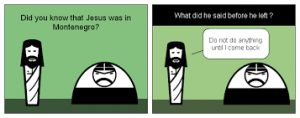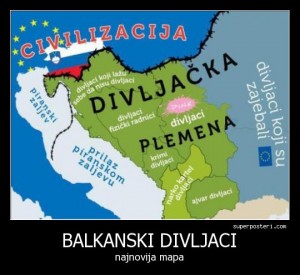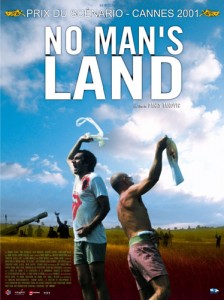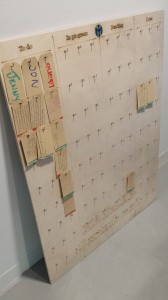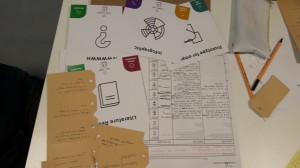A: Because the Bosnian once said to him: “Let me explain…”
In Yugoslavia this kind of jokes were made about all ethnic groups, and each group was made fun of, based on a different (negative) characteristic. In these jokes, Montenegrins were lazy, Bosnians were fools, and Slovenians were cheap. According to the famous Slovenian philosopher Slavoj Zizek these jokes were evidence of a very healthy society. They were told by each nation, and were often very self-deprecating, which enabled the nations to show that they were aware of their imperfections, and that it was perfectly fine to make fun of them. At the same time the stereotypes in these jokes were so overstated that they could not be taken seriously. It was clear that while there may have been some truth in these preconceptions, the nations could not be defined by them. Lasty, and maybe most importantly, these jokes often showed the various people in Yugoslavia shared a certain kinship/relationship, and that they belonged together. The following joke is a good example of that:
“A Montenegrin, a Serb and a Bosnian come to the railway station. Once they arrive, they realize that the train is leaving. They start running: the Montengrin gives up immediately, the Serb shortly afterwards, only the Bosnian manages to hop on the train and leave. The Montenegrin and the Serb return looking somewhat discontented. A person who observed it all asks them: “How is it that the Bosnian got on, and you didn’t?” – “Oh, that guy?! The fool was only supposed to take us to the station.”
Unfortunately these jokes and stereotypes were used in a much less innocent way after the break-up of Yugoslavia. The, often minor, differences between the nations were used to justify nationalistic, exclusionary ideals. Our goal during the first weeks at MediaLab was to research how Yugoslavia’s successor states used these stereotypes to differentiate themselves from the other nations, and how these stereotypes have been culturally and historically formed. We had to that, because in order for our project to be successful, we have to understand the historical and cultural context of (post-war) Yugoslavia.
In short, we found out at that differences in language and religion are most heavily emphasized. The Catholic Croats and Slovenes used their religion and their Latin alphabet to show that they are much closer to Western Europe than to the Balkan. For the Serbs, Montenegrins and Macedonian’s the Cyrillic script is a source of pride. As they are among the few nations in the world to use that script, they feel it makes them exceptional. The Bosnian Muslims, on the other hand use their religion to emphasize their connection to the Otoman Empire.
Most importantly, all these nations used these differences to claim that they are better and more civilized than the other nations, who were ‘barbaric’ and belonged to the ‘Balkan’. This stereotypical idea of the Balkan as ‘uncivilized and barbaric’ is called Balkanism, and is very similar to Said’s more famous concept of Orientalism. For Said, `Orientalism is a western construction that presents the Orient and its people as, among other things, barbaric, exotic and childlike, in order to define the west as the opposite’. Thus It is not very surprising that many (western-) European nation have used Balkanist language to exclude former Yugoslav nations from ‘Europeanness’. That makes it only more ironic that Yugoslavia’s successor states engaged in Balkanist rhetoric themselves, and often for the same reasons.
All of this is very nicely shown in the Bosnian movie No Man’s Land, which won the Oscar for Best Foreign Language Film in 2002 (beating Amelie!). No Man’s Land is a cynic comedy-drama set during the Yugoslav Wars. When a Serb and Bosnian accidentally get stuck together in the same trench, the two opposing nations are forced to work together to get them out. Tanovic shows the absurdity of the war by not differentiating visually at all between the Serb and the Bosnian fighter. Because they also speak the same language we would not have known who belonged to whom if we weren’t told so. The international UN-mission is not of much help either. Consisting mostly of French and Englishmen, they are completely confused when the Serbs and Bosnians do not conform to their stereotypical view of them. At the same time, the journalist from GlobalNews acts very moral and outraged, but GlobalNews is only interested in showing violence, not necessarily in context. The film does not spare the nations most directly involved either though. In the best scene a Bosnian soldier reacts astonished when reading a newspaper in the middle of a trench. When asked what he has read, he answers: ”Man, those damn Rwandans have horribly messed up”, referencing of course to the Civil War beteen Hutu’s and Tutsi’s in the nation.
These research-focused weeks were very valuable to us. We will try to apply what we have learned to our development of our tool. That means that in the coming weeks we will have to focus a bit less on theory, and a bit more on design. We use a design method called SCRUM, that was new to all three of us, but we are slowly understanding its great usefulness. The method forces you to work in a structured way, and even more importantly, it forces you to produce stuff consistently. Each three weeks we are supposed to deliver some prototype. We are currently working on a very basic prototype of a website, made in Illustrator. The website will be a visualization of our research. In the next months we will (hopefully) develop more sophisticated prototypes.






